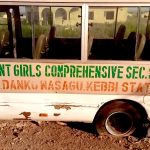By Amina Khalid Muhammad, Kano
Despite repeated bans on street begging by the Kano State Government, internally displaced families from Borno State—many affected by the Boko Haram insurgency—have returned to Kano’s streets due to hunger, homelessness, and lack of support.
A recent visit by Kano Times to Kabuga Junction, France Road, Race Course Road, and Magajin Rumfa showed children moving between vehicles, knocking on windows, and asking for food or money. Many were barefoot, wearing worn-out clothes.
Most of these children come from families that fled violence in towns like Bama and Gwoza. In Kano, they have no shelter or support.
“We lost everything back home,” said Zainab Musa, a mother of four who begs daily at Race Course Road. “My husband is gone. I have no relatives. These children and I sleep by the roadside. Sometimes under a bridge, sometimes just beside the traffic. If it rains or the heat is too much, we endure it.”
With temperatures in Kano above 40°C, conditions have worsened. Children suffer from fevers, dehydration, and mosquito bites, without access to medical care.
“I get hot all the time, and my body aches,” said 10-year-old Amina. “My mother thinks it’s malaria, but we can’t afford medicine.”
“Children in open environments without mosquito nets or clean water are at high risk of malaria, typhoid, and skin infections,” said Dr. Auwalu Sani of Murtala Muhammad Specialist Hospital. “With the high temperatures we’re seeing, there’s also the danger of heatstroke, especially for vulnerable children.”
Despite occasional arrests by Hisbah and other agencies, families return to the streets soon after.
“The government says street begging is banned, but where are the shelters? Where is the food, the education, the rehabilitation?” said Malam Aliyu, a community volunteer. “These people are not here by choice. They’re here because they’ve been failed—by conflict, by poverty, and by silence.”
Many junctions in Kano are now informal camps—tarpaulins tied at street corners, mats under bridges, children growing up without school or security.
Without action, it is hunger—not any government directive—that continues to push these families onto the streets.





